Permissive Parenting Style Definition These Are The Types Of Parents That Are Very Lenient And Let Their Children Express Themselves The Most.
Permissive Parenting Style Definition. The Developmental Outcomes For Children Reared In Permissive Homes Are Also Generally More Negative Compared To Those Reared In Authoritative Homes.
SELAMAT MEMBACA!
Permissive parenting is characterized by parents who are responsive to their children, but lack rules and discipline.

Permissive parenting is a type of parenting style characterized by low demands with high responsiveness.
Permissive parenting styles represent one of four types of parenting that psychologists recognize.
Understanding what the permissive parenting definition is, learning your parenting style and making adjustments can help you make better parenting choices as you relate to your children.
/2794957-what-is-permissive-parenting-5b2c035943a103003654116b.png)
However, they are overly accepting of their children's behaviour, good or bad.
They feel their children are capable of making their own decisions with little parental guidance.
Permissive parenting definition, characteristics and effects.
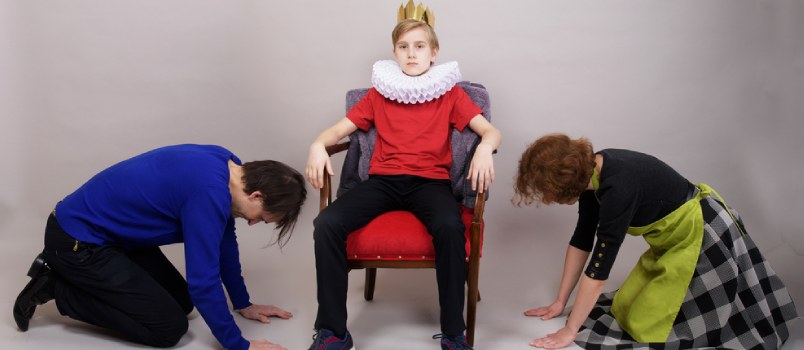
The official, psychological definition of permissiveness concerns parental control.
Are permissive parents too lax?
What criteria must parents meet the textbook definition.

The quality of parenting can be more essential than the quantity of time spent with.
Permissive parents are not demanding.
Kids do not have many responsibilities and are allowed to regulate their behavior and the majority of their this parenting style involves:
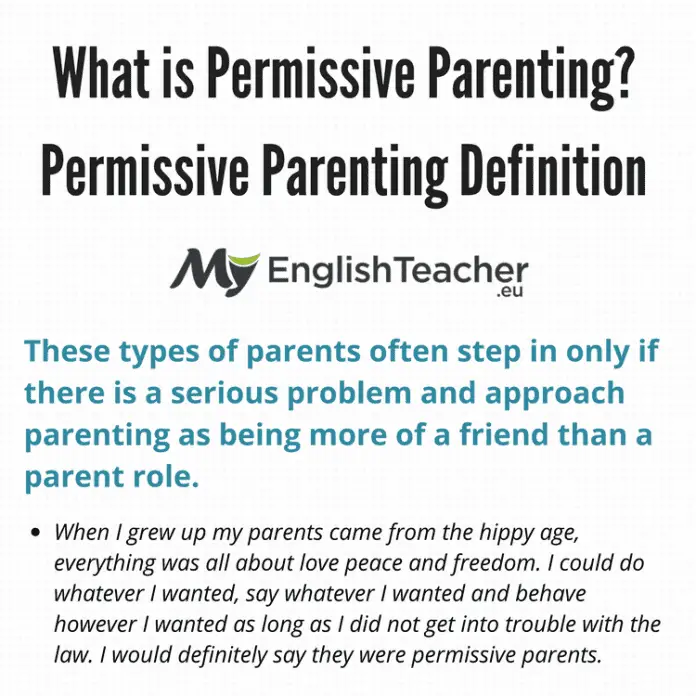
Rejecting the notion of keeping their kids under control.
Permissive parents usually take on more of a friend role than a parent role.
They often encourage their children to talk with them about their problems, but they usually don't put much effort into discouraging poor.

But they are least demanding because they have low expectations on children may love permissive parenting style as it gives them the maximum freedom without any strings attached.
My parents definitely followed a permissive parenting approach, i guess that is why i might be more authoritative.
Some people believe that being using a permissive parenting style is a lackadaisical attitude and suggest that kids need more of a authoritative approach.

Taking diana baumrind's definition a step further by understanding the psychological fears of permissive confusion reigns when defining 'what is permissive parenting?' trying to find a universally applicable definition of permissiveness in.
Permissive parenting is accommodating parenting (sometimes even referred to as indulgent parenting).
Permissive parenting is a type of parenting style characterized by low demands with high responsiveness.

Someone who cares about other people and doesn't want to hurt anyone.
While permissive parents are often very responsive and loving, this parenting style is defined by having no rules.
The term was developed by psychologist permissive parents have a hard time setting limits with their children, says laura markham, ph.d., author of peaceful parent, happy kids.
It is also known as i ndulgent parenting.
Psychologists maccoby and martin expanded baumrind's permissive parenting style into 2 different types:
P ermissive parenting and n eglectful parenting.
/1095045-article-types-of-parenting-styles-5a7cb6aaa18d9e00362ef5eb.png)
Parents adopt a very friendly parenting approach in this kind of parenting style, and they often do not expect their children to act or behave in a mature manner.
Effects of permissive parenting style.
The developmental outcomes for children reared in permissive homes are also generally more negative compared to those reared in authoritative homes.
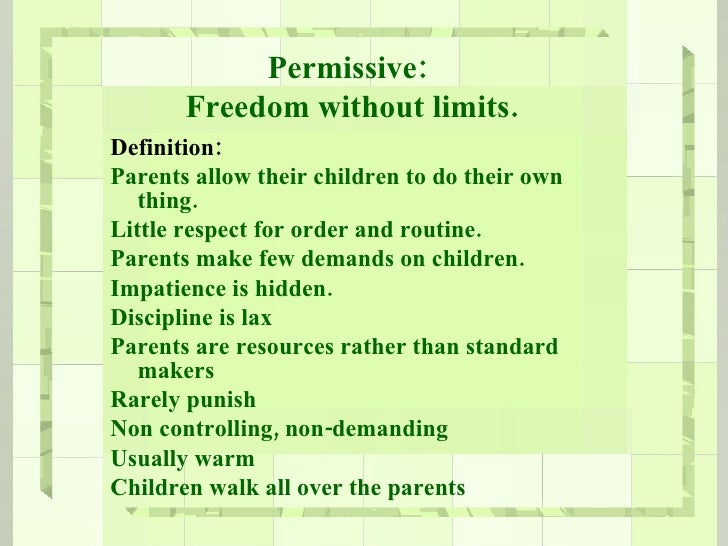
Permissive parenting is a style of parenting where parents typically want to be viewed by their kids as a 'buddy' rather than a parent.
While permissive parents are often described as being very nurturing and loving, this controversial style of parenting is defined for having no rules.
Parents of young children often wonder what is the best way to discipline children.

But as time goes by and the child starts growing up, the evidence of permissiveness begins to show.
Permissive parenting is a parenting style that tends to be very gentle and affectionate, with few rules or expectations for how a child should behave, child therapist katie lear explained to scary mommy.
These parents tend to be great at all of the warm, fuzzy interactions that build strong attachment but.
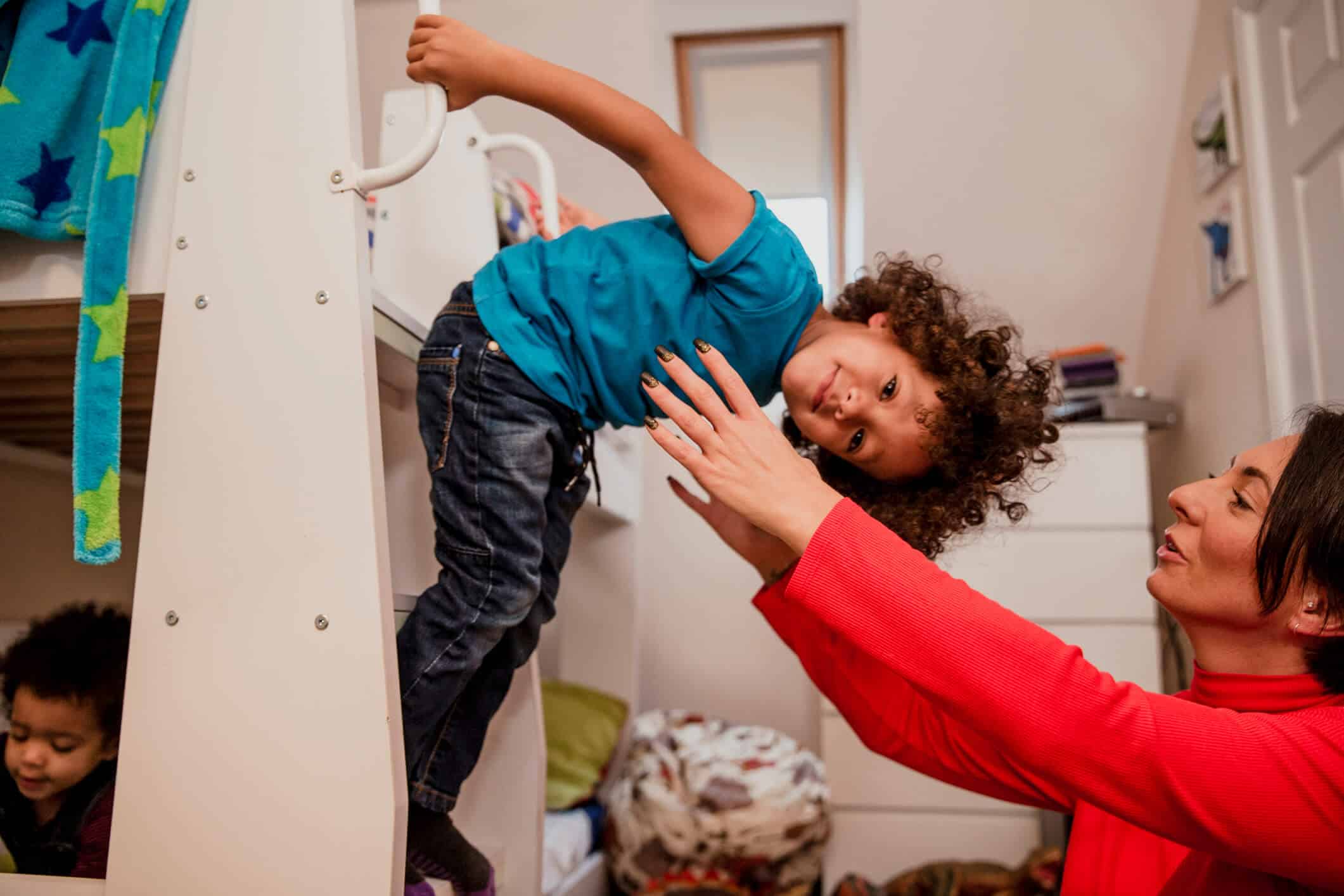
These are the types of parents that are very lenient and let their children express themselves the most.
The limits in this relationship can be.
The permissive style of parenting has many drawbacks.

Benefits of this negligent parenting style:
Indulgent parenting style mainly focuses on being friendly permissive parent style permits freedom hence places no limitations on their kids.
That's the reason kids happen to explore everything and become.

Few of us fit neatly into one single parenting style, but rather raise children using a combination of styles.
Think of the four styles as a continuum instead of four distinct ways to parent.
Children of permissive parents don't tend to have many responsibilities or chores, and their days how it might affect kids:

Check out the pronunciation, synonyms and grammar.
Authoritarian and permissive parenting styles have been negatively associated with school performance, while an authoritative parenting style has been associated with achievement.
A parenting style is a way of bringing up your child with a specific approach.
If there's ever a serious issue, the parent will always step in to offer.
Seem more like a friend than a parent, standards of behaviour and rules, if any, are often very inconsistent.
There are a number of parenting styles but there is no particular parenting style that can be said to work for every child and parent.

Although stricter than permissive, it is not nearly as extreme as authoritarian.
This style encourages critical thinking and discussion within the family unit along with.
The second style is permissive.

There is little to no punishment for bad behavior, because they don't want to get too involved.
Ini Fakta Ilmiah Dibalik Tudingan Susu Penyebab Jerawat5 Khasiat Buah Tin, Sudah Teruji Klinis!!Ternyata Tidur Terbaik Cukup 2 Menit!Ternyata Mudah Kaget Tanda Gangguan MentalAwas, Bibit Kanker Ada Di Mobil!!Ternyata Jangan Sering Mandikan BayiTernyata Ini Beda Basil Dan Kemangi!!Cegah Celaka, Waspada Bahaya Sindrom HipersomniaTernyata Cewek Curhat Artinya SayangMana Yang Lebih Sehat, Teh Hitam VS Teh Hijau?Permissive parents practically let the children have control, giving them too many choices. Permissive Parenting Style Definition. There is little to no punishment for bad behavior, because they don't want to get too involved.
Parents who exhibit an uninvolved parenting style were often themselves raised by uninvolved and dismissive parents.

Other parents who display this style may simply be so caught up in their busy lives that they.
Having some or more of the following characteristics does not necessarily mean that you are an uninvolved or neglectful parent.
Uninvolved parenting is a parenting style characterized by low responsiveness and low demandingness.

They are practically left to raise themselves.
Uninvolved parenting style may affect a child in more than one way, and some of the effects of neglectful parenting on a child may include the following once you have become the victim of this parenting style, so does that mean that you cannot undo the effects?
Uninvolved parenting, often known as neglectful parenting, is just a style seen as too little responsiveness to a kid's requirements.

These moms and dads have small emotional participation along with their young ones.
Uninvolved parents are the ones who disengage from their children daily.
Uninvolved parenting could lie on a spectrum.
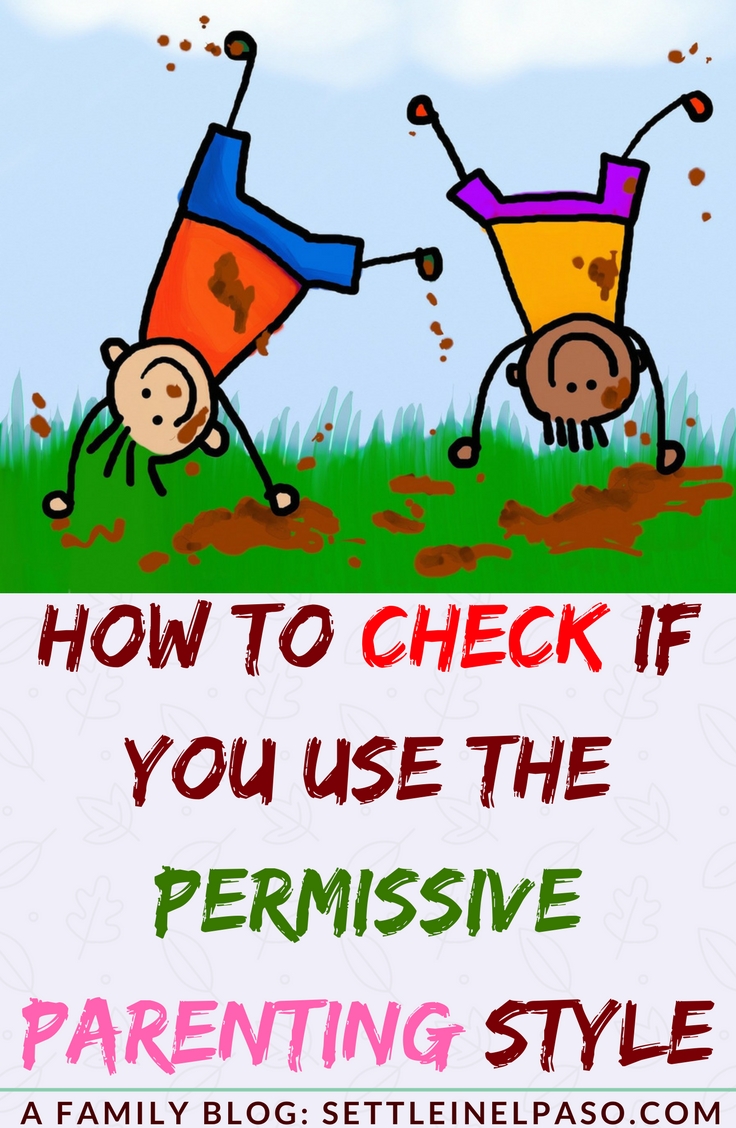
The uninvolved parenting style (often referred to as neglectful parenting) as the name implies, the parent is totally disengaged and emotionally uninvolved in their child's life.
There is little if any expression of love and affection.
Developmental psychologist diana baumrind in her studies based on.

This means, that the parents show absolutely no love or affection for the child.
They are constantly busy with their own work and lives and seem to find no time to spare for the children, whether it is to take them out for sports.
Uninvolved parents do not pay much attention to their children, which means these children end up lacking discipline and proper boundaries.

Uninvolved parenting is a parenting style not very famous.
Yet many parents practice it.
Here's everything you need to know about it.
A parenting style is simply defined as a way of raising a child.
Parenting styles were first the four styles are based on two distinct principles named demand and response, which simply means that your the uninvolved parenting style is a common parenting style that occurs when parents are.
Uninvolved parenting, sometimes referred to as neglectful parenting, is a style characterized by a lack of responsiveness to a child's needs.
Uninvolved parenting could lie on a spectrum.
Many parents may provide a lot of resources like a house and food security, but neglectful parenting however, permissive takes the top quadrant.
This means that — while lacking in demandingness and control — it's high in responsiveness and warmth.

Some parents may make a conscious decision to parent in this way, while others are less interested in parenting or unsure of what to do.
No particular discipline style is utilized.
Uninvolved parenting style has minimal or no involvement in children's overall requirements.parents are least involved in children's physical and emotional.

Here are its causes, effects on your child and how.
Discover which style leads to the best outcomes for kids.
If those statements sound familiar, you might be an uninvolved parent.
Characteristics of uninvolved parenting style.
Either there is a total lack of supervision which means a household deficient of discipline.
Or parents who exercise such strict rules on their kids that they.
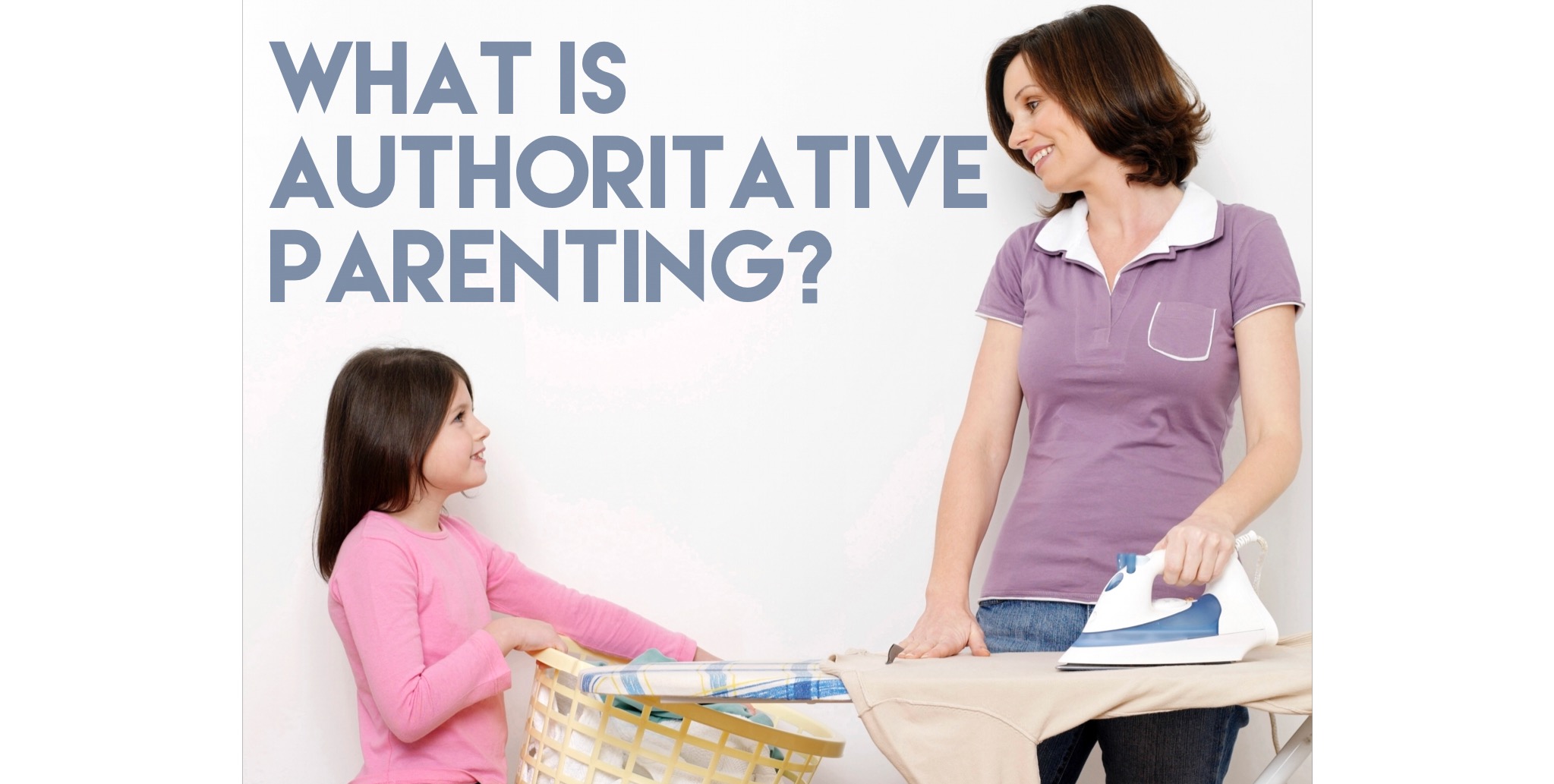
The authoritative style of parenting can be described as democratic with parents being willing to discuss options and to negotiate rules and expectations.
A parenting style is a psychological construct representing standard strategies that parents use in their child rearing.
The quality of parenting can be more essential than the quantity of time spent with.

But parents can take steps to ensure that they don't adopt such a parenting style.
You were probably raised by neglectful parents.
Like the other parenting styles, uninvolved parenting can have consequences for children that last into adulthood.
However, this doesn't mean permissive parents don't support their child.
If there's ever a serious issue, the parent will always step in to offer guidance and support.
Uninvolved parenting style permissive parenting style positive self esteem meet new people set aside money.
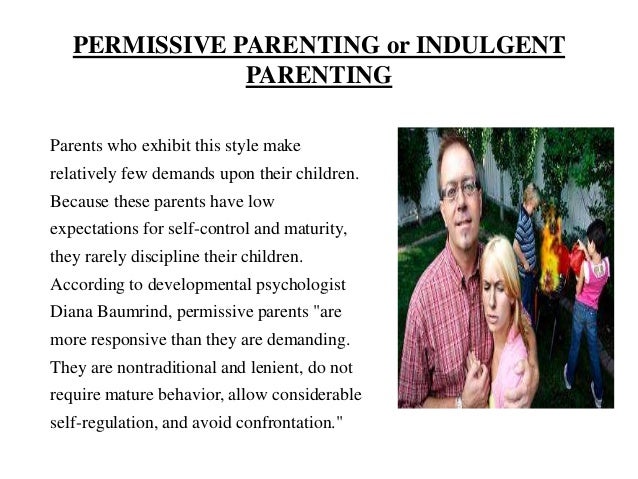
Uninvolved parents are like permissive parents in their failure to enforce standards.
But unlike permissive parents, uninvolved parents are not as noted above, the authoritative parenting style was first conceived as a kind of middle ground between permissiveness and authoritarianism.
Relating parenting styles and children's temperament.

Uninvolved, have significant influence on the performance of students in junior social studies.
These styles are generally based on the amount of support parents provide and the amount of control they try to exert.
And most have their pros and what it looks like:
With an infant it can mean not.
€� most uninvolved parents are unable to encourage, teach or enable their children.
They are often indifferent in their behavior toward their children and lack the knowledge to meet their children's even basic needs.

As you might imagine, each of these parenting styles is marked by distinctive patterns of behavior and communication.
One single parenting style may seem ideal, but all kids are unique and what they need from their parents may differ depending upon their.
Permissive parents are not the same thing as neglectful parents.

Neglectful parents also provide no structure ore rules, but they're also totally uninvolved in other aspects of the child's life.
Permissive parents are involved, but.
Not all parenting styles are created equal.

Thus the uninvolved parenting style is thus characterized by low behavior control (demandingness) and low parental responsiveness (warmth).
This means that children who have suffered from toxic parenting often come to struggle with severe guilt complexes and a very, very poor level of self esteem.
Thus the uninvolved parenting style is thus characterized by low behavior control (demandingness) and low parental responsiveness (warmth). Permissive Parenting Style Definition. This means that children who have suffered from toxic parenting often come to struggle with severe guilt complexes and a very, very poor level of self esteem.Sensasi Kholaqul Ayyam Gumeno, Hanya Ada Saat Ramadhan9 Jenis-Jenis Kurma TerfavoritResep Racik Bumbu Marinasi IkanIkan Tongkol Bikin Gatal? Ini PenjelasannyaResep Beef Teriyaki Ala CeritaKulinerResep Garlic Bread Ala CeritaKuliner Khao Neeo, Ketan Mangga Ala ThailandResep Ayam Kecap Ala CeritaKuliner3 Cara Pengawetan CabaiFoto Di Rumah Makan Padang
Komentar
Posting Komentar